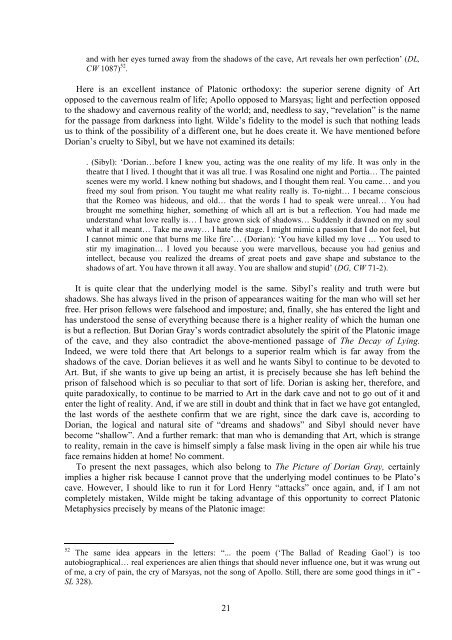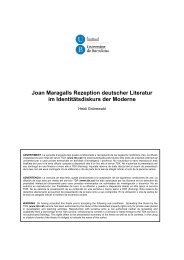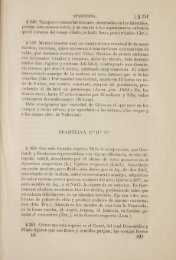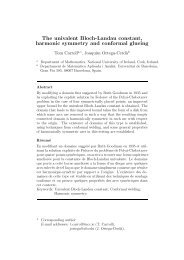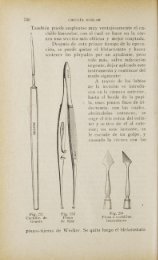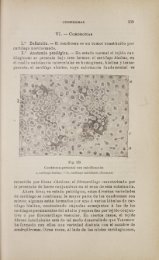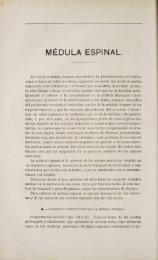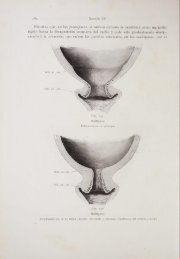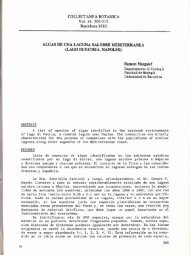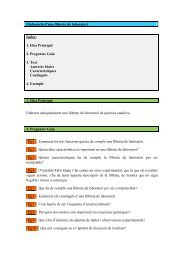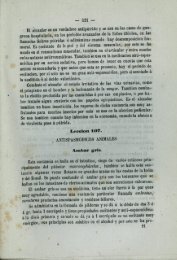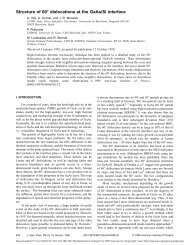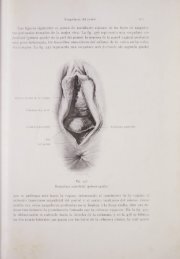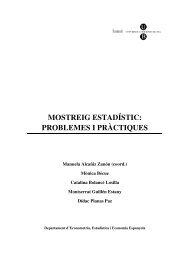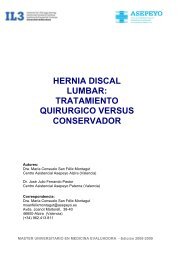Wilde Parsa ang_12080.pdf - Dipòsit Digital de la UB - Universitat ...
Wilde Parsa ang_12080.pdf - Dipòsit Digital de la UB - Universitat ...
Wilde Parsa ang_12080.pdf - Dipòsit Digital de la UB - Universitat ...
Create successful ePaper yourself
Turn your PDF publications into a flip-book with our unique Google optimized e-Paper software.
and with her eyes turned away from the shadows of the cave, Art reveals her own perfection’ (DL,<br />
CW 1087) 52 .<br />
Here is an excellent instance of P<strong>la</strong>tonic orthodoxy: the superior serene dignity of Art<br />
opposed to the cavernous realm of life; Apollo opposed to Marsyas; light and perfection opposed<br />
to the shadowy and cavernous reality of the world; and, needless to say, “reve<strong>la</strong>tion” is the name<br />
for the passage from darkness into light. <strong>Wil<strong>de</strong></strong>’s fi<strong>de</strong>lity to the mo<strong>de</strong>l is such that nothing leads<br />
us to think of the possibility of a different one, but he does create it. We have mentioned before<br />
Dorian’s cruelty to Sibyl, but we have not examined its <strong>de</strong>tails:<br />
. (Sibyl): ‘Dorian…before I knew you, acting was the one reality of my life. It was only in the<br />
theatre that I lived. I thought that it was all true. I was Rosalind one night and Portia… The painted<br />
scenes were my world. I knew nothing but shadows, and I thought them real. You came… and you<br />
freed my soul from prison. You taught me what reality really is. To-night… I became conscious<br />
that the Romeo was hi<strong>de</strong>ous, and old… that the words I had to speak were unreal… You had<br />
brought me something higher, something of which all art is but a reflection. You had ma<strong>de</strong> me<br />
un<strong>de</strong>rstand what love really is… I have grown sick of shadows… Sud<strong>de</strong>nly it dawned on my soul<br />
what it all meant… Take me away… I hate the stage. I might mimic a passion that I do not feel, but<br />
I cannot mimic one that burns me like fire’… (Dorian): ‘You have killed my love … You used to<br />
stir my imagination… I loved you because you were marvellous, because you had genius and<br />
intellect, because you realized the dreams of great poets and gave shape and substance to the<br />
shadows of art. You have thrown it all away. You are shallow and stupid’ (DG, CW 71-2).<br />
It is quite clear that the un<strong>de</strong>rlying mo<strong>de</strong>l is the same. Sibyl’s reality and truth were but<br />
shadows. She has always lived in the prison of appearances waiting for the man who will set her<br />
free. Her prison fellows were falsehood and imposture; and, finally, she has entered the light and<br />
has un<strong>de</strong>rstood the sense of everything because there is a higher reality of which the human one<br />
is but a reflection. But Dorian Gray’s words contradict absolutely the spirit of the P<strong>la</strong>tonic image<br />
of the cave, and they also contradict the above-mentioned passage of The Decay of Lying.<br />
In<strong>de</strong>ed, we were told there that Art belongs to a superior realm which is far away from the<br />
shadows of the cave. Dorian believes it as well and he wants Sibyl to continue to be <strong>de</strong>voted to<br />
Art. But, if she wants to give up being an artist, it is precisely because she has left behind the<br />
prison of falsehood which is so peculiar to that sort of life. Dorian is asking her, therefore, and<br />
quite paradoxically, to continue to be married to Art in the dark cave and not to go out of it and<br />
enter the light of reality. And, if we are still in doubt and think that in fact we have got ent<strong>ang</strong>led,<br />
the <strong>la</strong>st words of the aesthete confirm that we are right, since the dark cave is, according to<br />
Dorian, the logical and natural site of “dreams and shadows” and Sibyl should never have<br />
become “shallow”. And a further remark: that man who is <strong>de</strong>manding that Art, which is str<strong>ang</strong>e<br />
to reality, remain in the cave is himself simply a false mask living in the open air while his true<br />
face remains hid<strong>de</strong>n at home! No comment.<br />
To present the next passages, which also belong to The Picture of Dorian Gray, certainly<br />
implies a higher risk because I cannot prove that the un<strong>de</strong>rlying mo<strong>de</strong>l continues to be P<strong>la</strong>to’s<br />
cave. However, I should like to run it for Lord Henry “attacks” once again, and, if I am not<br />
completely mistaken, <strong>Wil<strong>de</strong></strong> might be taking advantage of this opportunity to correct P<strong>la</strong>tonic<br />
Metaphysics precisely by means of the P<strong>la</strong>tonic image:<br />
52 The same i<strong>de</strong>a appears in the letters: “... the poem (‘The Bal<strong>la</strong>d of Reading Gaol’) is too<br />
autobiographical… real experiences are alien things that should never influence one, but it was wrung out<br />
of me, a cry of pain, the cry of Marsyas, not the song of Apollo. Still, there are some good things in it” -<br />
SL 328).<br />
21


